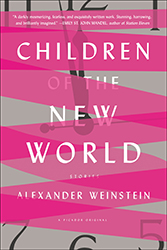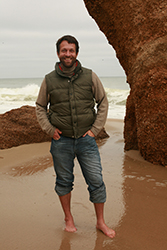Join a community of readers who are committed to Jewish stories
Sign up for JBC’s Nu Reads, a curated selection of Jewish books delivered straight to your door!
Earlier this week, Alexander Weinstein shared how the cosmic humor of his science fiction stories was discovered by Rabbi Zalman Schachter-Shalomi. With the release of his book Children of the New World, this week, Alexander has been guest blogging for the Jewish Book Council as part of the Visiting Scribe series here on The ProsenPeople.
I was in my mid-twenties when I met Rabbi Zalman again. It was a rough time for me as a writer and a young man. I had graduated with a BA in Creative Writing, a degree which I discovered was good for finding restaurant work. I was working over 60-hour workweeks as a chef, had recently become a father, was overworked, overtired, and worried I would never make it as an author. I was trying to keep my writing alive in the few spare hours I had. I saw that Rabbi Zalman was teaching a course called Rituals for People Healers. I missed the university life, and missed studying with Zalman, so I asked if I could sit in on his class. And in this way, Reb Zalman reentered my life at a time when I needed him the most.
 The class centered around creating rituals for others during times of need. As Reb Zalman explained, there were major events in life, such as divorces, teenage years, deaths in the family, buying or selling one’s home, infidelities, promotions and lay-offs, which we didn’t have elaborate rituals for. Yet, these events were often highly significant rites of passage, and times when we most needed the love and support of our family, friends, and community. Because of a lack of ritual around these key moments, Zalman believed people were left with unresolved emotions and a feeling of disconnection from their community. So the class explored the occasions where we, as “people healers,” might be called to create rituals to help friends and family through difficult transitions. The class was a kind of training ground to equip us with the resources of ritual creation which we might use to help those we cared for. Zalman’s central philosophy was that, as humans, we had an obligation to help build a larger and more loving world.
The class centered around creating rituals for others during times of need. As Reb Zalman explained, there were major events in life, such as divorces, teenage years, deaths in the family, buying or selling one’s home, infidelities, promotions and lay-offs, which we didn’t have elaborate rituals for. Yet, these events were often highly significant rites of passage, and times when we most needed the love and support of our family, friends, and community. Because of a lack of ritual around these key moments, Zalman believed people were left with unresolved emotions and a feeling of disconnection from their community. So the class explored the occasions where we, as “people healers,” might be called to create rituals to help friends and family through difficult transitions. The class was a kind of training ground to equip us with the resources of ritual creation which we might use to help those we cared for. Zalman’s central philosophy was that, as humans, we had an obligation to help build a larger and more loving world.
The class was a powerful one, and it gave me a structure for community building — a teaching which led to my founding of The Martha’s Vineyard Institute of Creative Writing, the non-profit organization I founded seven years ago, whose focus is aiding writers within a summer arts community where they can work and be creatively inspired. I didn’t know it at the time, but Zalman’s teachings would shape my future. It also turned out to be the last time I would talk with my rabbi.
Soon after the semester ended, I moved to Indiana with my family, where I pursued my MFA in Fiction. In the years that passed, I often thought about Rabbi Zalman — promising myself to write him soon and thank him for all his wisdom, guidance, and generosity. Time passed, I worked on my stories, and found myself busy with fatherhood, publishing, editing, directing the Institute, and the daily demands of life.
Last year, on a spring day, I decided to finally search out Reb Zalman and write him a letter. As I searched for his email address, I discovered the news that he had died two years earlier, in 2014. There was no one to share my grief with, and so, in the ways Reb Zalman had taught me, I held a ritual to say goodbye to the man who’d so deeply influenced my life.
 I’ve been listening to Reb Zalman’s teachings as I drive to work these days, watching his YouTube videos, and hearing his singing of Judaic chants. In one video, he stands in the Rocky Mountains, his voice beautiful as he brings all those around him into the presence of the sacred. As I listen to his teachings, I’ve come to understand how profoundly Reb Zalman has influenced my writing. Many of the stories in my collection, Children of the New World, are about people who are trying to live good lives within a world where technology has separated us from human interaction. The hope beneath the tales is that we might better practice what it means to reach out to our neighbors, friends, and family to create a more nurturing community — one which exists in our physical reality rather than within online worlds. The collection, like my work with the Martha’s Vineyard Institute, is another extension of Rabbi Zalman’s teachings: to remember what it means to be “people healers” and to do what we can to make this world a better and more loving place.
I’ve been listening to Reb Zalman’s teachings as I drive to work these days, watching his YouTube videos, and hearing his singing of Judaic chants. In one video, he stands in the Rocky Mountains, his voice beautiful as he brings all those around him into the presence of the sacred. As I listen to his teachings, I’ve come to understand how profoundly Reb Zalman has influenced my writing. Many of the stories in my collection, Children of the New World, are about people who are trying to live good lives within a world where technology has separated us from human interaction. The hope beneath the tales is that we might better practice what it means to reach out to our neighbors, friends, and family to create a more nurturing community — one which exists in our physical reality rather than within online worlds. The collection, like my work with the Martha’s Vineyard Institute, is another extension of Rabbi Zalman’s teachings: to remember what it means to be “people healers” and to do what we can to make this world a better and more loving place.
Alexander Weinstein is the director of the Martha’s Vineyard Institute of Creative Writing. He is the recipient of a Sustainable Arts Foundation Award, and his stories have received the Lamar York, Gail Crump, and New Millennium Prizes. He is an associate professor of creative writing at Siena Heights University and leads fiction workshops in the United States and Europe.
Related Content:
Alexander Weinstein is the author of Universal Love and Children of the New World, which was named a notable book of the year by The New York Times, NPR, and Electric Literature. He’s a recipient of a Sustainable Arts Foundation Award, and his stories have appeared in Best American Science Fiction & Fantasy and Best American Experimental Writing.